Disability Data
Are persons with disabilities included in the effort to leave no-one behind?
Mapping disability data in development in Asia and the Pacific
As the United Nation’s sexual and reproductive health agency, UNFPA’s mandate is grounded in the Programme of Action of the 1994 International Conference on Population and Development, which calls for the realization of the rights of all persons. This includes people living with disabilities and their participation in all aspects of social, economic and cultural life.
In the Asia Pacific region, UNFPA and partners work together to implement the Incheon Strategy to “Make the Right Real” for Persons with Disabilities. The Incheon Strategy is the region's first set of disability-specific development goals to track progress towards the fulfilment of rights of persons with disabilities.
In the region, it is estimated that there are over 650 million persons with disabilities. However, without accurate, timely and disaggregated data, countries are unable to develop effective policies and programmes, monitor the wellbeing of persons with disabilities and evaluate the equity and impact of development efforts. This endangers country commitments to ‘leave no one behind’ and undermines their obligations to the Convention on the Rights of Persons with Disabilities.
This groundbreaking report demonstrates the importance of ensuring data is inclusive and provides recommendations for immediate action in order to improve the collection, analysis and reporting of disability data. We hope this report will be used as a tool for future advocacy and ultimately better data for all. - Björn Andersson, UNFPA Asia and the Pacific Regional Director
Summary
- Data is essential for government officials and policy makers to fulfil the rights of persons with disabilities. Understanding what, why and how data is collected is important to inform future advocacy and investment in disability data.
- In 2021, a mapping of the status of national collection from censuses and large household surveys including the use of disability data in the Asia and Pacific region was undertaken through the United Nations Population Fund (UNFPA) Asia Pacific Country Offices. A sample of persons with disabilities also shared their experiences around disability data.
- Most of the respondent countries have significant gaps in their overall technical capacity to produce and disaggregate critical development indicators by disability.
- Although many respondent countries can disaggregate the indicators they produce, very few are using questions framed around functioning to identify persons with disabilities, for example, the Washington Group questions. This raises questions on the quality, usefulness and comparability of the data.
- Capacity varies greatly across the region; with half of the respondent countries unable to produce and disaggregate by disability more than two of the six indicators examined more closely in the survey.
-
Only 1 in 4 of the respondent countries in the Asia-Pacific region could monitor critical disability inclusion indicators relating to healthcare access.
-
Only 1 in 5 of the respondent countries in the Asia-Pacific region were using internationally recommended methods for identifying persons with disabilities in their national data systems.
-
Only in 1 in 4 of the respondent countries in the Asia-Pacific region were systematically identifying and reporting on barriers and enablers for persons with disabilities to access education.
-
Many persons with disabilities are concerned about inadequate data and evidence around disability, but do not feel they know enough to confidently use or advocate for better data.

High-level summary of recommendations
National Statistical Offices (NSOs)
- Incorporate the Washington Group Questions into upcoming national censuses and surveys, prioritising key data gaps such as health.
- Articulate technical assistance needs including capacity development to aid advocacy and investment decisions.
- Plan analysis of key development indicators where disability data has been collected but not yet used for disaggregation.
Donors and technical partners
Provide support for:
- Dedicated technical assistance and capacity development packages to NSOs that report a lack of capacity, including supporting peer learning and exchange.
- Further research into the reasons for current data gaps. For example, the findings suggest that while some countries collect data that would allow them to disaggregate certain indicators by disability, they are not doing so. Further research is needed to understand and then address this.
- Research into clear recommendations for data that can be used to drive efforts for reducing disparities in areas such as the barriers and enablers to employment and education.
- Disability-specific surveys to provide more detailed insights not currently captured in existing indicators.
Organisations of Persons with Disabilities (OPDs) and their civil society partners
- Articulate the key priorities of the national disability movement and related data needs – such as employment, primary education and health – in order to help governments, and prioritise data collection and analysis efforts.
- Create awareness within various levels of governments of disability data needs and good practice.
- Develop the capacity of OPD members and allies to understand, appropriately use and advocate for improved disability data, through multi-stakeholder training, data processes and other means.
Multi-stakeholder
- Establish a regional, cross-stakeholder working group of disability data advocates to develop a resource mobilisation and investment advocacy work plan for disability data.
- Bring together statisticians, policymakers, United Nations (UN) agencies, OPDs, and Non-Governmental Organisations (NGOs), to exchange information, learn from one another and create evidence-based policies for sustainable change.
This report resulted from a partnership between UNFPA Asia Pacific and CBM Global Disability Inclusion, in close collaboration with the Stakeholder Group of Persons with Disabilities, the International Disability Alliance, as well as national and regional OPDs, including the ASEAN Disability Forum and Pacific Disability Forum. The partnership aims to build resources, awareness and capacity around disability data with key stakeholders, including OPDs, national statistics offices, donors, related UN entities and others, drawing from experiences and resources in the Asia Pacific region. The project resources and lessons will act as a foundation for expanding disability data literacy training and future advocacy in the region and more broadly.
SUMMARY - METHODOLOGY - FINDINGS - DISABILITY DATA ADVOCACY
WASHINGTON GROUP QUESTIONS - WHERE ARE WE?
OPINION PIECE - MEDIA RELEASE - PDFs


